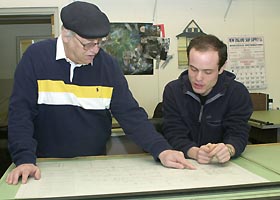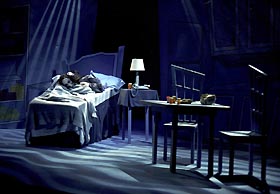|
This is an archived
article. For the latest news, go to the Advance Homepage
For more archives, go to the Advance Archive/Search Page. |
||||
|
Design Student Makes Light Of His Experience
"I try not to analyze the lighting because I like to watch the show," says Spitzer, a senior from Chestnut Ridge, N.Y., who is studying lighting design at UConn. He attends a dozen or so shows each year, and would go to more if his schedule weren't so packed: Last semester, Spitzer, a student in the Honors Program, took 23 credits, was the lighting designer for several UConn productions, and assisted with productions at the Goodspeed Opera House in East Haddam and the Long Wharf Theatre in New Haven. He was also the assistant lighting designer for Connecticut Repertory Theatre's Nutmeg series during the summer.
Spitzer, who is working on a bachelor of fine arts degree in design/technical theater with a specialization in lighting design, will graduate in May at age 20 after just three years. He was recently one of 15 students chosen from around the country to exhibit his theater lighting at the Young Designers Forum at the United States Institute of Theater Technology's national conference in Minneapolis. He also is a national finalist for one of the most prestigious lighting design internships in the business: the Gilbert V. Hemsley Jr. Lighting Design Internship at the State Theatre at Lincoln Center in New York City to begin this summer. Spitzer doesn't seem to mind his hectic schedule. "I love what I do," he says. "Lighting heightens emotion. You make magic." He says what excites him about his work is the melding of the "physical and technical with the artistic. It's the best of both worlds." Spitzer thumbs through his portfolio and stops at an eerie image of a dark bedroom. It's a scene from Facets, a play written and directed by a master's degree candidate in puppetry. "The play is about a woman's struggle with depression," Spitzer says. "I had to convey that emotion. It's very surreal, based on French expressionism, with bold lighting." He then points to a photograph of a scene from Hansel and Gretel. "This is more naturalistic," he says, "with bright colors that go beyond realism. We wanted to make it fun for children." Spitzer is currently the lighting designer for UConn Opera's production of Mozart's The Magic Flute, to be performed April 5 and 6, and CRT's production of George Bernard Shaw's Misalliance, which runs April 24 through May 4. He spent last week in Manhattan helping design studio lighting for the first national television network devoted exclusively to college sports, College Sports Television. What Spitzer finds challenging about lighting is that "you have to visualize the end result. You can't really test it," he says. "In scenic or costume design you can draw your set or costumes and say, 'This is what it's going to look like.' But with lighting, it's getting what's in your mind to the stage, and you often don't know if it's going to work." That's the very challenge that motivates him. "Getting it to work drives me," he says. "Every show presents a new challenge - different spaces, different colors, all sorts of things. So you can only draw on experience so much." Lighting design is a collaborative process, he says. "You have to be able to work with directors, scenic designers, and costume designers." He notes that the lighting designer must know the play well. When he is assigned a show, Spitzer reads the script. If it's an opera or a musical, he will listen to the tape rather than see it. "I don't want to be influenced by other versions of the show," he says. His advisor, James Franklin, a professor of dramatic arts, says Spitzer is an outstanding student. "As a sophomore, he took graduate classes and competed favorably with my best graduate students." |
 hen Michael
Spitzer watches a Broadway show, it's hard for him to focus on
the performance. Instead, he finds himself intrigued by a gentle
shadow dancing on a tabletop, or a shaft of moonlight slipping across
the stage.
hen Michael
Spitzer watches a Broadway show, it's hard for him to focus on
the performance. Instead, he finds himself intrigued by a gentle
shadow dancing on a tabletop, or a shaft of moonlight slipping across
the stage.

